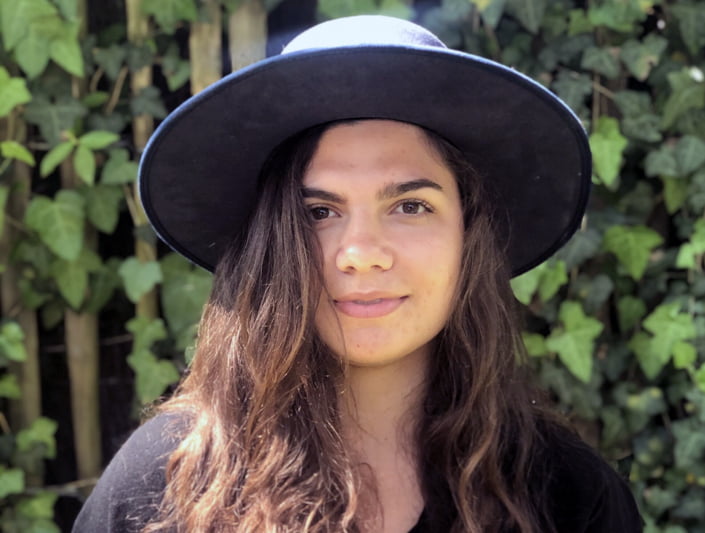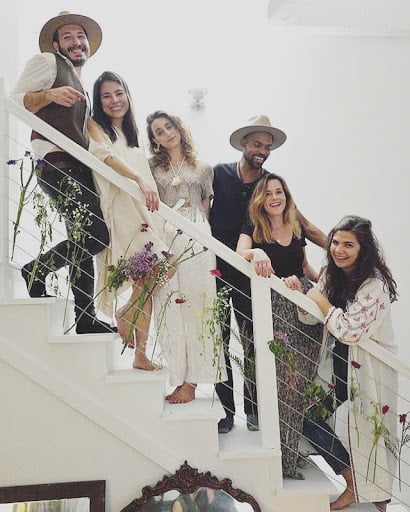Time to read: 7 minutes
Today we introduce you to Curator, Observer and Facilitator Charlotte Terrien.
Charlotte is a trained Experience Designer with a background in building communities and organizing milestone events around the world.

After her Service Design degree at Savannah College of Art and Design, she explored how to implement Design Thinking methodologies into an agency setting as well as in large corporations. She worked with a range of international clients from Audi, to Estee Lauder, Levi’s, Nike, and Visa.
Most recently, she oversaw non-academic programs for upperclassmen and alumni of new university Minerva – helping them understand the local culture, learn from professionals in the city, and connect as a community. She also led the development of the first virtual Graduation in response to COVID-19.
She’s an active member of Sandbox – an eclectic global community of entrepreneurial minds – and co-founded Domus Earth which explores human culture through transformational gatherings.
Hi Charlotte! Thanks for talking with us today. What would you say is unique about what you do?
I curate experiences that help people grow through connection to themselves, others and the surrounding environment.

What makes you stand out?
I’ve been told I ask curious questions (that people seem to enjoy…)
I like understanding humans and I naturally engage in deep conversations without asking myself twice if it is ok to ask something but rather pay attention to how and when I ask it. I also operate with loose boundaries between my professional and personal lives, which leads me to be very comfortable talking about anything with anyone. These conversations quickly create trust and generate deep relationships.

Experience designer is a very unique profession. What inspired you to go and do it?
When I was 15, I stumbled upon a 1-min video explaining the role of a product designer. There, I understood that everything around us is designed by someone for people to use — and I wanted to be part of that movement, specifically using creativity to improve people’s lives.
Studying service design led me to a deeper understanding of people’s behaviours and consequently how to create experiences that surprise and delight. As I started my career, I was nicknamed the “glue” of my team, “chief happiness officer” at work and the “planner” within my group of friends. I constantly took on side projects to organize events, dinners and trips for people to connect and grow. Over time, I saw an overlap between my community-building side-hustles and my design career and eventually became an Experience Designer, integrating my “formal” design toolbox for environments I cherish, in order to help people grow and thrive.
That’s amazing. I’m sure your work comes with quite some challenges as well. What is the biggest challenge you have dealt with and how did you overcome it?
The biggest professional challenge I have dealt with was creating an experience that was the most beautiful frontstage but also the most painful backstage. A few years ago, I co-hosted a several-day retreat, where guests had a highly transformative and positive experience while on the other side of the curtain, every day was a new obstacle for our team to overcome.
From the start, I felt that there were slight team misalignments but I had faith in our love for the project and commitment to it. As the project grew, when something felt off, I brought up my perspective. Nevertheless, as I was the youngest in the team I trusted my teammates knew better and I believed it was evident I had much to learn from them. I was in such admiration of them.
Looking back, I wish I had been stronger in standing by my opinions and today I’m grateful for the confidence I have built going through this. I acknowledge that all experiences are learning experiences and that the outcome of this particular one was a beautiful community of people who still empower each other to this day.
What is your Mount Everest? What would you love to create in the world?
I want to continue creating spaces for people to connect and grow. One day, I would love to have a physical space where people come in and out easily, feel at home, and grow on some level each time they come… a school for life perhaps?
That’s amazing. A few years ago you attended the iDiscover Core Programme. What is the most inspiring thing that happened to you as a result?
I did iDiscover a month or two before quitting my job. I was unsure what was going to happen next and left iDiscover feeling very inspired and confident in trusting who I am – knowing that I had options in front of me (without concretely knowing what these were) and that all were as great as the next. A few months later, I started a new job and never felt as aligned as I did there.
What do iDiscover and its community mean to you?
To me, iDiscover is a self-development program, intertwined with social behaviour theory. While in the program, I felt like I was back in school – learning about the human condition – and working on my personal endeavours at the same time. People who dive into personal development programs are either at specific intriguing moments in their journeys or constantly interested in knowing more about themselves and understanding humans – for both of these reasons the iDiscover community gathers interesting and curious people.
What is your most sacred daily/weekly/monthly ritual or performance hack that really works for you?
Yoga has become a very important ritual for me. I started practising seven years or so ago because I knew it was good for my body but it took me several years to understand the depth and multi-layered effect of this practice. Today, I not only know that it is good for my body but I also feel it. Moreover, it helps me feel centred and at peace – it has become like a meditation.

What is your guilty pleasure?
Dark chocolate (dipped in almond butter)
That sounds delicious. Definitely going to try that! To finish the interview… What is your favourite quote or the question you want to leave us with?
I recently completed Vipassana (10-day silent meditation retreat) and the main teaching there is about observing sensations rather than reacting to them. To that end, I’ll say “this too shall pass” and ask “what are you holding on to and how can you let go?”
Beautiful. Thanks for the interview Charlotte!
